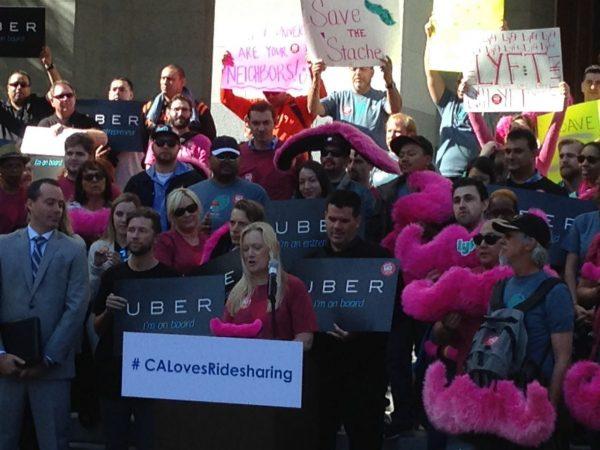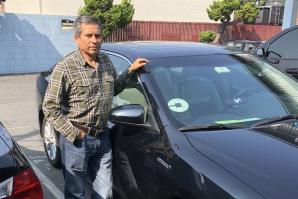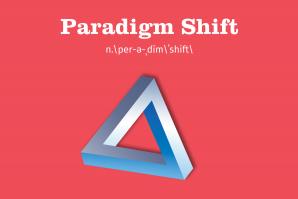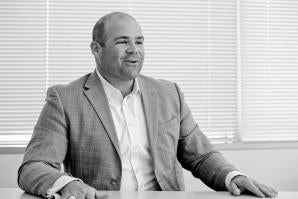When Uber and Lyft began trading on Wall Street as idealistic, tech-disrupting startups, some of their earliest investment came from the nation’s largest public pension funds.
Since then, their reputations have become less wholesome: Not long ago, an alliance of Uber and Lyft drivers wrote the California Teachers’ Retirement System, cautioning against investment in companies that exploit workers and destabilize the tax base, as critics say the sharing economy has done.
CALmatters took the questions posed by Gig Workers Rising and Mobile Workers Alliance in their letter (embedded below) to former state Treasurer and Controller John Chiang, who got CalSTRS to agree to work toward divesting in an earlier set of alleged corporate bad guys, gun manufacturers and dealers. (The California Public Employees’ Retirement System declined.)
Chiang knows the issues well. For private workers without retirement security, he championed the CalSavers program to set up retirement savings accounts for low-wage workers. During his unsuccessful bid for governor, he championed affordable housing and backed Medicare for all.
He also sat for more than a decade on both pension boards, and though he is off them now, he intimately understands the challenges facing the funds, which have a fiduciary responsibility to California’s teachers, firefighters and other state workers.
As a generational swell of baby boomers retire, those funds are under tremendous pressure to return huge investment earnings. Yet despite a decade of economic growth, CalSTRS is just 64% funded and CalPERS is 71% funded.
Below is an exchange with Chiang on his nuanced view of public employee pension funds, tech companies and the future impact of automation on workers. Questions and answers have been edited for length:
Q: Uber and Lyft workers are advocating for better protections. One of their strategies was to send letters to public pension systems. I don’t mean to make a moral equivalency to guns, but how hard is it to make change at the pension boards?
A: There’s this incredible tension in regards to making sure you meet your rate of return so that the pension can meet its immediate and long-term cash flow obligations for the beneficiaries. So where the rub often occurs is you know you have companies that are in the short term incredibly profitable, [but] you can imagine there will be market issues because of their behavior.
The approach by CalPERS and CalSTRS has been to engage with the corporations. Try to make sure they have sustainable practices because PERS and STRS are long-term players.
In the gun context, we pushed very hard because Californians and their elected representatives made a statement that certain activities [the retail sale of assault-style weapons, high capacity magazines and bump stocks] were illegal. And I didn’t believe that CalPERS and CalSTRS, having the taxpayers and beneficiaries’ money, should be investing in companies that were engaged in actions deemed illegal in California.
So there’s the legal issue, policy issues and financial considerations. You have to maximize the risk-adjusted return, look at the risk considerations and then make a decision.
It would be instructive to the gig workers to think within that framework [as] they’re making their argument on why CalPERS and CalSTRS should engage with them, and how CalSTRS and CalPERS put their money into private equity firms, [or] invest in companies.
Q: Where do you stand?
A: They [Lyft and Uber] are not acting illegally but I appreciate those considerations. As a board member – I’m not sure the others would agree, but I would certainly bring up, “How are you going to address the labor challenges?”
Frankly, the question has to go back to these companies because the workers have a greater concern as the rise of autonomous vehicles comes into existence. That’s going to have a profoundly dislocating impact on their employment.
I’d certainly be engaging with multiple parties here.
Gig economy workers rally at the Capitol in 2014. Photo by Shawn
Hubler for CALmatters

A: From a human aspect, it’s a really hard one. But the world is constantly evolving and that’s why CalPERS and CalSTRS and other institutional investors have to be looking at other ideas and invest in developing human capital. It’s hard because it’s uncertain and the jobs are certainly going to look different for the workers.
Q: One of the letter’s arguments is that they’re investing in companies that exploit workers, which undermines the pension base because public employee pensions need taxpayers to fund those public-sector jobs. Fundamentally, isn’t this about having workers make living wages to pay for those publicly funded jobs?
A: It’s important that we understand that technology has always displaced jobs, but it’s also created new jobs. It’s important for institutional investors remain sensitive to companies and their positions. But that doesn’t mean [defining] final action as not investing in any of these companies.
Q: So you don’t have an issue with CalPERS or CalSTRS investing in Uber and Lyft?
A: Investing in the private equity firms or venture capital firms that invest in companies such as Uber and Lyft? No.
We’d certainly want to engage with the companies to make sure they have labor practices that are sensitive to employees, you know, recognition of health care, pension benefits, to make sure they have sustainable models.
I’m OK directing questions to those private equity firms and getting responses. It’s not an automatic exclusion to investment.
Q: We’ve seen a swing from a willingness to divest from tobacco to “let’s stay engaged with gun manufacturers.” I’m just wondering, is there anything CalPERS and CalSTRS shouldn’t invest in when the funded status is so low because teachers are retiring?
A: The answer is yes. I made my position clear, which was the only outlier vote. But it reflected the positions of a lot of other companies at that time. Whether it’s Dick’s Sporting Goods or Walmart or Delta, they were choosing not to sell or invest in companies that were engaged in those types of gun sales. I was with the majority at CalSTRS, but there are different philosophies for different boards.
In regards to the tobacco investments, we know from the long term that the fund has lost money but in the short term actually they saved money by not being in it. So part of that is that hard question of timing and fully understanding all the consequences. People thought divesting would impact the market but the tobacco companies were smart and they continued to expand internationally, beefing up their profitability. It’s those unexpected twists and turns that have an impact on the market.
Q: What do you make of the pension funds’ health and stability?
A: There’s still a lot of work to do. Obviously, the world has changed dramatically. The investment expectations have changed materially. You have a lot of bright and talented people doing their best, but how people designed a plan decades ago is very different from the world that exists today…
Think back a decade ago to the iPhone and what it did. Who knows what’s going to happen in the future? They have their work cut out for them.
Q: What would you advise these gig workers who are trying to get Uber and Lyft improve their employment benefits?
A: There’s been a lot more openness recently from the Uber drivers I’ve used in talking about their compensation versus the way they talked about it a year ago. Some are in agreement and some are in disagreement.
It’s not that they don’t think they should get paid more, but people have very different perspectives as to whether they’re an employee or not an employee and what corporate responsibilities to independent contractors are.
Q: So do the gig workers have to be more unified?
A: You’re never going to have unity. But often times, if you have an influential group rising and advocating, they can force a lot of change.
Q: I want to add in the view of organized labor. Public employee unions strongly value pensions as necessary for a good middle-class lifestyle. And yet, their pension funds are investing in Uber and Lyft, which don’t provide that for their workers. Is this a necessary evil — to invest in companies that don’t give as much to their workers?
A: I think labor and the business community, they’re going to have to continue to come to the table and discuss what future compensation packages look like. The current system is not working, unfortunately, for close to half of Americans where they don’t have retirement savings. And that’s why I was encouraging, especially the workers but all the parties involved, to work with the institutional investors to have a constructive conversation about what can be done with policies, not just government policies but corporate policies.
Q: Should public employee unions be worried for gig workers?
A: Yeah. In many respects, they [the unions] set the tone of what compensation looks like.
A lot of the labor-supported research has been to come up with creating a pool where gig workers can go to access insurance or health care, work on retirement savings. They understand that you have a lot of detached individuals who are going to face a difficult future unless they have that type of security.
Q: Are Covered California and CalSavers pieces of the puzzle?
A: They absolutely are. Labor has been, certainly from a thought perspective and research perspective, looking at gig economy future and how to put in place the underlying foundation for at least a baseline of financial security.
CALmatters.org is a nonprofit, nonpartisan media venture explaining California’s policies and politics. Comstock’s magazine is a CALmatters media partner.
Recommended For You

Gig Companies Beg for Relief from Pro-Labor Supreme Court Ruling
State and federal labor laws give employees a wide range of worker protections, from overtime pay and minimum wages to the right to unionize. But those rights don’t extend to independent contractors, whose ranks have grown dramatically in the gig economy.

On the Move
Is taller, denser housing near transit hubs right for the Capital Region?
City officials and developers are eyeing transit hubs for residential projects — but can it be effective in the Capital Region, which lacks the mass transit hubs of larger cities?

Buzzwords: Paradigm Shift
When the usual model of thinking about or doing something is replaced by a new and different model.

A New Market
Sacramento pot czar Joe Devlin on how the city is adopting legal cannabis
Joe Devlin, Sacramento’s first chief of cannabis policy and enforcement chats about what can be expected in the near future for legal cannabis in Sacramento.



